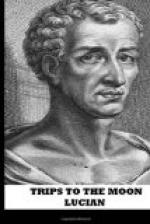Lucian had another translator in 1820, who in no way
superseded Dr. Francklin. The reader of this
volume is reminded that the notes are Dr. Francklin’s,
and that any allusion in them to a current topic,
has to be read as if this present year of grace were
1780.
H.
M.
INSTRUCTIONS FOR WRITING HISTORY.
Lucian, in this letter to his friend Philo, after having, with infinite humour, exposed the absurdities of some contemporary historians, whose works, being consigned to oblivion, have never reached us, proceeds, in the latter part of it, to lay down most excellent rules and directions for writing history. My readers will find the one to the last degree pleasant and entertaining; and the other no less useful, sensible, and instructive. This is, indeed, one of Lucian’s best pieces.
My Dear Philo,—In the reign of Lysimachus, {17} we are told that the people of Abdera were seized with a violent epidemical fever, which raged through the whole city, continuing for seven days, at the expiration of which a copious discharge of blood from the nostrils in some, and in others a profuse sweat, carried it off. It was attended, however, with a very ridiculous circumstance: every one of the persons affected by it being suddenly taken with a fit of tragedising, spouting iambics, and roaring out most furiously, particularly the Andromeda {18a} of Euripides, and the speech of Perseus, which they recited in most lamentable accents. The city swarmed with these pale seventh-day patients, who, with loud voices, were perpetually bawling out—
“O tyrant love, o’er gods and men supreme,” etc.
And this they continued every day for a long time, till winter and the cold weather coming on put an end to their delirium. For this disorder they seem, in my opinion, indebted to Archelaus, a tragedian at that time in high estimation, who, in the middle of summer, at the very hottest season {18b} of the year, exhibited the Andromeda, which had such an effect on the spectators that several of them, as soon as they rose up from it, fell insensibly into the tragedising vein; the Andromeda naturally occurring to their memories, and Perseus, with his Medusa, still hovering round them.




